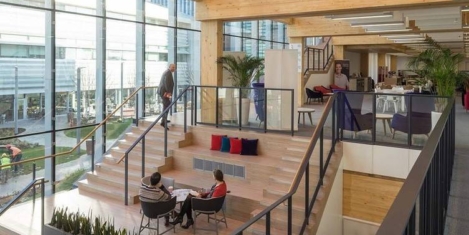To provide the best experiences, we use technologies like cookies to store and/or access device information. Consenting to these technologies will allow us to process data such as browsing behaviour or unique IDs on this site. Not consenting or withdrawing consent, may adversely affect certain features and functions.
The technical storage or access is strictly necessary for the legitimate purpose of enabling the use of a specific service explicitly requested by the subscriber or user, or for the sole purpose of carrying out the transmission of a communication over an electronic communications network.
The technical storage or access is necessary for the legitimate purpose of storing preferences that are not requested by the subscriber or user.
The technical storage or access that is used exclusively for statistical purposes.
The technical storage or access that is used exclusively for anonymous statistical purposes. Without a subpoena, voluntary compliance on the part of your Internet Service Provider, or additional records from a third party, information stored or retrieved for this purpose alone cannot usually be used to identify you.
The technical storage or access is required to create user profiles to send advertising, or to track the user on a website or across several websites for similar marketing purposes.
 Undeterred by political and economic headwinds in recent years, London remains a world leading financial centre and is by far the most active centre in Europe, according to the latest research from global real estate advisor CBRE. According to the report, 1.1 million people were employed in the UK financial services sector in 2017, of which 34 percent were in London. The industry contributed £119bn to the national economy (7% of UK GDP) – half of this was generated by London, where it accounted for 14 percent of the city’s economic output.
Undeterred by political and economic headwinds in recent years, London remains a world leading financial centre and is by far the most active centre in Europe, according to the latest research from global real estate advisor CBRE. According to the report, 1.1 million people were employed in the UK financial services sector in 2017, of which 34 percent were in London. The industry contributed £119bn to the national economy (7% of UK GDP) – half of this was generated by London, where it accounted for 14 percent of the city’s economic output.






 London’s office market continues to attract occupiers and investors, despite political and economic uncertainty JLL’s recent Central London offices seminar revealed. The event highlighted the strength of the capital’s office market where Central London has seen sustained levels of both leasing and investment activity so far in 2018 and JLL anticipates that the final numbers will match, if not exceed those recorded in 2017. Take-up of offices across Central London reached 8.3m sq ft at the end of Q3 2018, with 3.1m sq ft leased in the West End and 4.5m sq ft in the City.
London’s office market continues to attract occupiers and investors, despite political and economic uncertainty JLL’s recent Central London offices seminar revealed. The event highlighted the strength of the capital’s office market where Central London has seen sustained levels of both leasing and investment activity so far in 2018 and JLL anticipates that the final numbers will match, if not exceed those recorded in 2017. Take-up of offices across Central London reached 8.3m sq ft at the end of Q3 2018, with 3.1m sq ft leased in the West End and 4.5m sq ft in the City.




 The new northern home of the BBC is giving London a run for its money when it comes to siting offices for the UK’s top tech talent, with Manchester leading the way, according to
The new northern home of the BBC is giving London a run for its money when it comes to siting offices for the UK’s top tech talent, with Manchester leading the way, according to 


















October 26, 2018
We need to move on from the stigma of mental health to finding solutions
by Gary Helm • Comment, Wellbeing
(more…)